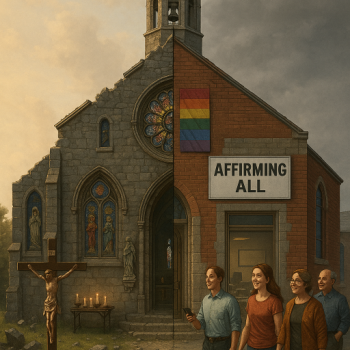Cultures change. What is overlooked about the Crusaders, and the knights and nobility of the 10th century and thereabouts, is that they were very bloody-minded. They had been raised since infancy to devote themselves to fighting. They were very sinful. They particularly were into coveting wives. And they were very religious.
The fact that these things can be combined strikes the modern mind as bizarre. But you have to deal with it if you're going to understand these people. They would commit a horrid crime, and their confessor would say, "I don't know if you can ever get over that one. I don't know if atonement is in the books for you. But you better walk barefoot to the Holy Land and hope that that works."
And they'd go. And then come back and sin some more.
It takes some stretching to understand what motivated these people.
Popular media representations of the Crusades depict the white-skinned Europeans slaughtering and conquering the brown-skinned natives. Yet the picture is more complicated than this. You point to the fact that the Holy Land had previously been inhabited by many Christians and Jews. Were there still Christians and Jews living in the Holy Land when the Crusades began?
Sure. Probably the majority of the population in some parts of the Holy Land still were Christians and Jews. Certainly most of North Africa was still mostly populated by Christians and Jews as well. There were these small ruling Muslim groups on top; the conversion to Islam took centuries and centuries before Christians more or less disappeared.
The civilization we typically associate with Islam was in fact the civilization of the Christians and Jews they were ruling. When those Christians and Jews finally disappeared, so too did that advanced "Muslim" civilization. Suddenly the Muslims were all backward, and the question was, "How did they lose all that civilization?" They didn't. They never had it.
The famous "Islamic" architecture, for example, was not Islamic. It was eastern Christian.
A Ridley Scott film, The Kingdom of God, presented Saladin as principled and restrained in his conduct of war, and the Europeans as utterly lawless and rapacious. Is this accurate?
No, not at all. Saladin was your typical eastern butcher. He liked to chop people's heads off personally. Somehow, in the late 19th century, people got into romanticizing Saladin as part of this genteel, sophisticated eastern culture.
Kaiser Wilhelm in the 1890s placed a bronze wreath on the tomb of Saladin, and it said on the wreath, "From one great emperor to another." I find it more than fitting that during World War I, when T. E. Lawrence was leading his irregulars all over the area, he stole that wreath and it's now in the British War Museum.
It was all nonsense. In fact, Saladin was about as great an emperor as Kaiser Wilhelm was.
What of the sacking of Constantinople, when western Christians who had set out to reclaim the Holy Land decided instead to attack eastern Christians? This is often taken as a classic example of the irrationality and ultra-violence of the Crusaders.
It seems to be pretty clear that, through about four crusades, the Byzantines had betrayed the westerners. In the First Crusade, they were supposed to send their army along, and they did not. They were supposed to supply the knights, and they did not. They tried to make separate peace agreements, which was virtually treasonous. This went on and on and on.
Eventually, the knights from the west, having backed a faction of the Byzantines, found themselves having been betrayed again and starving outside of Constantinople. So they sacked the city. It's a wonder they didn't do it sooner.
We are sometimes told that Muslims and Muslim societies have a much longer view of history than we do, and the extremists among them, who have perpetrated violence upon the west in the past two decades, see the present struggle as a continuation of the struggle that "began" with the Crusades.
Until about the start of the 20th century, the Muslims didn't even remember there had been Crusades. This is all about 20th-century nationalism. The whole issue was: How did we get so backward? And the Muslims aren't the only ones who made up the myth that it was the westerners who made them so backward. We are told that almost all other parts of the world are backward or were backward because somehow they got exploited by Europe. It's all very well and good -- but it's all nonsense.
There wasn't any discussion about the Crusades until the 20th century, when it became one of the slogans of Arab nationalism. And even then, it was a pretty minor issue until the formation of the state of Israel. That's when suddenly the Crusades became a really big thing with Muslim nationalists. "We can blame the West for everything, including Israel." That may be good politics, but it's rotten history.





